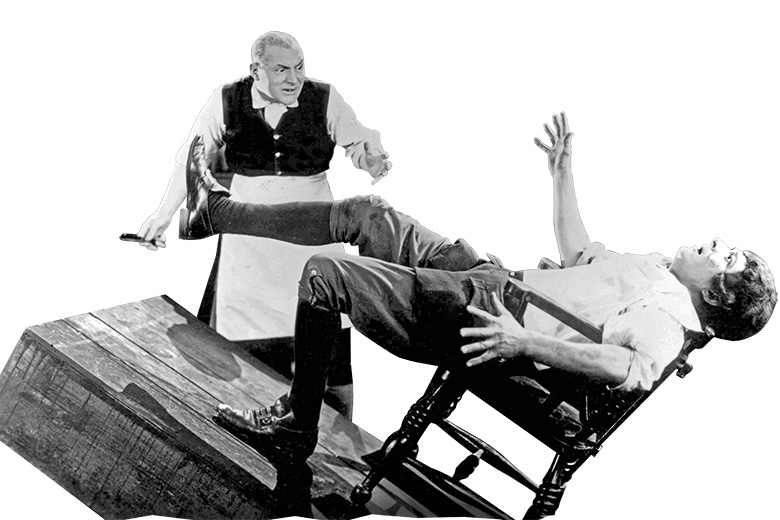For all the efforts in recent years to improve the doctoral experience for students, Times Higher Education still receives a steady supply of horror stories from PhD candidates. To the authors of such submissions, the system appears, at best, indifferent to them and, at worst, outright exploitative. Here, we present three such examples – all of whose writers, tellingly, feel the need to remain anonymous, given the power dynamics involved.
Perhaps such tales are inevitable. Perhaps, even with the best will in the world, there will always be supervisor-supervisee relationships that just don’t function; expectations that, however heartfelt, just aren’t realistic; supervisors who just can’t find the time to give the kind of detailed supervision that they would like to give, and that students feel they need.
But perhaps there is still more that could be done to ensure that this most intense and crucial of academic relationships doesn’t end up on the rocks. In that spirit, two academics with strong views on the matter – one from science and one from the humanities – set out how they think the supervisory task should best be approached. Their guidance may not amount to a stake through the heart of the PhD horror franchise: as B-movie history amply demonstrates, good advice is not always heeded. But the exposure of the problems to further sunlight may at least slow the drip-drip of blood on to the doctoral carpet.

I had never felt so helpless in my life. The university wholly and blindly supported my supervisors, ignored my concerns and suggested, again, that I was making things up
When I was offered a fully funded doctorate in a UK environmental science laboratory, I was delighted and accepted instantly. I assumed that the experience of working in an international environment and the many transferable skills that I would learn would be a stepping stone to an exciting career beyond the academy. Little did I know that what I had signed up for would destroy not only my career plans but also my passion for the subject, my ambition and my self-confidence.
My supervisors turned out to have limited knowledge of the topic that they had so glamorously advertised, and the university lacked the facilities and machinery that I needed. Left with precious little guidance, I was obliged to work with methods that would do very little to enhance my career. An obvious solution was to set up an external collaboration, but my supervisors were reluctant to sanction it. They didn’t seem to want to share the glory with anyone else, but the environment that they created meant that there was never likely to be much glory to share anyway.
It didn’t help, either, that I am female. My male supervisors, in a male-dominated field, constantly made belittling remarks that they would never have made to a male student, remarks that led me to doubt my own capabilities. My doctorate became a living nightmare, and, after a year of ineffectively trying to solve the issues directly with my supervisors, I decided to take things further.
Because the head of my department had just resigned, I sought help from the university’s students’ union. But joint meetings with a union representative and my supervisors seemed to go nowhere, culminating in accusations that I was “making up” the issues. The union subsequently managed to arrange a meeting with the head of the graduate school, but, nearly six weeks after our meeting, he deemed my case too complex and I was ultimately told to solve my issues with my supervisors directly!
I had never felt so helpless in my life, and I was amazed at how unconcerned the university apparently was about student well-being. After months of more meetings with my supervisors and the union, I was contacted by the departmental postgraduate tutor, who expressed “concern” about my progress. This offered me a ray of hope. However, as usual, things got worse rather than better. The university wholly and blindly supported my supervisors, ignored my concerns and suggested, again, that I was making things up. I was offered an additional female supervisor, but, while welcome, that would have done little to solve the other issues.
I was given an ultimatum. I had two weeks to decide if I wanted to continue with my PhD and “accept” things as they were. The alternative was to leave – without any form of diploma or certificate for my two years of work (which included the publication of a first-author paper).
My last throw of the dice was to contact my funding body. However, my entire funding had already been transferred to my university, so there was little that it could do to help me. Thus I had no other choice but to quit and to watch as the university swept my case under the carpet, documenting my withdrawal as the result of “personal and health issues”.
Although the experience has cost me a lot, it also taught me a considerable amount. I learned to be wary of offers that seem too good to be true. I learned not to take my rights for granted. I learned the value of having expectations, commitments and offers put down in writing. I learned to trust no one.
I also learned a lot about how higher education institutions function. I discovered that they will do whatever it takes to cover up their own mishaps to save their reputation, even if it comes at the cost of destroying a young person’s career.
Anecdotally, cases similar to mine are becoming increasingly common. In recent months, there have been multiple ongoing cases at my former university, including more withdrawals. However, the university just recruits more students to make up for the losses.
It is well known that PhD students are widely seen by academics as a cheap workforce. But to be treated with such little respect by the people who are supposed to foster your career and help you to succeed is just not right in any workplace.
The author prefers to remain anonymous.
If you want to supervise and mentor with integrity and thoughtfulness, it is ultimately up to you to decide to do so, and to make the rules. You cannot assume good ethics on the part of your department
The power that you as a supervisor have over a student or postdoc is immense. Your actions, whether they are kindnesses, temper tantrums or intimacies, have the potential to shake up trainees to a much greater degree than their actions can affect you. And, most of the time, trainees have no way to solve conflicts with you if you won’t negotiate. Hence, it is your responsibility not to abuse your power.
But it takes integrity and clarity not to do so. Doctoral supervision is challenging. Your first difficulty is in acknowledging and getting beyond unrealistic expectations of your students that you might not even know you have. In science, new supervisors often imagine a lab filled with idealised workers: miniature versions of themselves, who churn out data and submit manuscripts. So when their charges don’t do exactly what they expect, they feel frustrated.
You might also observe that other supervisors allow their people to flounder, or even to fail. And even though you don’t want that, you have never had the lessons in personnel management that might ensure it doesn’t happen. Academic departments and institutions may or may not provide support to guide supervisors and students in building effective relationships.
If you want to supervise and mentor students with integrity and thoughtfulness, it is ultimately up to you to decide to do so, and to make the rules. You cannot assume good ethics on the part of your department. Nor can you assume, as a scientist, that your research group will passively absorb your good intentions. You must consider what you haven’t been trained in graduate school to consider: your own ethics, morals and sense of justice. Accept what institutional help exists, but if the policies at your institution render trainees expendable, you must develop the courage to stand up to power.
And then you build a framework for your students in which your ethics, rules and expectations are clear. For example, if you want your people to know that you are concerned with their professional futures, don’t let them drift without guidance. Evaluate each person regularly, and give feedback and compassionate criticism – not just on results but also on communication skills, presentation skills, time management and other characteristics of a successful professional. Keep notes on your meetings and follow up on what you and the trainee have discussed. Check in frequently and provide multiple opportunities for discussion and interaction. Be present.
Authorship and project choice are other vital areas where your policies can reflect your intentions to have a collaborative rather than a competitive climate. How are projects chosen? Do you actively foster collaboration, putting new people to work with more established lab members in a way that both parties benefit from, and will you continue to guide and monitor those collaborations? Do you intend to compete with your own trainees when they leave, or will you allow them to take their projects with them? Who writes the papers? How is authorship decided? Will you protect your people in authorship disputes with collaborating groups, or will you sacrifice a trainee to keep last authorship for yourself?
Create a group manual, with protocols, policy and helpful information, being specific about whatever you consider to be important for students to know. Include information about where trainees can find help if they have a personal or project issue – including problems with you.
You also need to be prepared to deal with the inevitable conflicts between lab members. Learn not to fear it, as that fear can mould you into a little dictator and keep you from understanding what people need. Have a process to work through conflicts (look up “interest-based conflict resolution”), as fair process often carries more weight with people even than achieving the outcome they wanted. Explain that process to your students, too: conflict resolution is one of the most valuable skills you can pass on. Don’t run from emotions – research is an emotional business – but learn to control your own emotional responses so that they don’t interfere with your communications.
Talk about ethical behaviour, and model that behaviour. If you expect your people to meet deadlines, you should be on time for meetings and return manuscripts and phone calls predictably. If you hear someone making a racist or sexist remark, correct the person: doing nothing will send the message that such behaviour is OK by you.
It is also important not to let yourself, or anyone else, become isolated. Make a point of introducing your students to your former students and postdocs – as well as to experts in their fields – when they visit or when you encounter them at meetings. Model the value of mentors by having mentors yourself, for personal and professional advice. Have the confidence to encourage trainees to have other role models and mentors, especially if they move into a project area in which you aren’t expert: having mentors is the start of building a web of relationships that will support trainees all through their lives.
But students must also be activists. Some supervisors eat their young, and some institutions allow it. As a student, you have the greatest level of control before you accept a position, so look for a place where you are respected and can do the work that you believe in. Ask other students questions about the scholarship and mentorship of particular supervisors before you make the decision to sign on. Once there, find role models, and get to know your community. The more you are integrated with others, the more people there are to help should your relationship with your supervisor or your project go badly.
It is unfortunate and unfair that students are not always protected, and that leaving might be the only solution to a toxic situation, but that is the harsh reality. So, as a student, doing all that you can to ensure that you will be appreciated and fulfilled in the position you accept is worth the effort.
Kathleen Barker is clinical assistant professor at the University of Washington School of Public Health. She is the author of At the Helm: Leading Your Laboratory (Cold Spring Harbor Laboratory Press).

PhD students are often made to feel like they are a huge burden on their supervisors, and they are frequently ignored and unsupported
Tom sent his supervisor a chapter of his PhD thesis to read six weeks ago. He can’t start on the next chapter until he receives feedback on what he has already done. But he has had no response despite chasing up his supervisor – with whom he gets on well personally – several times. Indeed, he has not even received an acknowledgement of his email. And he knows that when he does finally receive a reply, there will be no mention of the delay, let alone an apology. He knows that because this has all happened before.
But this time the situation plays out even more egregiously. After Tom has waited for two more weeks, he finally hears back – a full two months after his initial email. But his supervisor has checked only the first two pages and the last page of his chapter, ignoring everything between.
Tom is frustrated, but he thanks his supervisor for the feedback and does not challenge her over the delay. How can he when he is entirely dependent on her to get him through the PhD submission process and to supply a good reference for subsequent job applications? Besides, sustaining a complaint would come down to his word against hers – and she is senior and well respected in the department and the university. No one would believe him. And even if they did, would it really be worth the hassle of getting another supervisor allocated to him in his final year – and, in the process, acquiring a bad reputation in the department for being the one who “made a fuss”?
So Tom soldiers on. Eventually, after much delay, he finishes his thesis. But is it ready for submission? He points out to his supervisor that he does not believe that the thesis has been checked properly, but she tells him to stop worrying, to take responsibility for his work and to be confident in its quality and in his ability to defend it. So he takes the plunge and submits. But he spends the next two months worrying that he might fail, rendering the past four years of hard work a complete waste of time.
This is a true story. And it takes only a few cursory searches of online PhD forums to see how common such scenarios are. PhD students are often made to feel like they are a huge burden on their supervisors, and they are frequently ignored and unsupported. Hence, even the most toxic student-supervisor relationships often persist long beyond the point of dysfunctionality, sometimes leaving the student with mental health problems.
I believe that this happens primarily because supervisors’ responsibilities are rarely clearly defined and because supervisors are not accountable to anyone for carrying them out. So I make the following recommendations:
- Training for supervisors must be compulsory
- Supervisors must be held accountable to someone senior in the department, and PhD students should be made aware of who that is
- Supervisors must be required to respond to their PhD students’ emails within three days, barring any type of leave
- Supervisors’ responsibilities need to be outlined clearly in a handbook that is available to both supervisors and students. It should also be made clear to students how much of their supervisors’ time each week or month is allocated to giving them feedback so that they are not made to feel like a burden
- Students must be assigned a mentor who is not close to their supervisor or in the same research team – ideally in another department altogether. This person can help to alleviate concerns and act as an intermediary when necessary
- There should be an anonymous procedure within each department that PhD students can use to complain or give feedback about their supervisor
- Supervisors should be formally encouraged to ask their students annually how they could better support them. This should be part of supervisors’ yearly appraisals.
In the absence of such steps, such stories as the one above will continue to write themselves over and over again.
The author prefers to remain anonymous.
If a relationship works well, it can be life-changing for the student and deeply rewarding for the supervisor. Supervising PhDs, I have been directed along paths that I would not have discovered otherwise
There is no doubt in my mind that the best part of being an academic over the years has been supervising PhD students. I cannot remember how many I have supervised, but the number runs to well over 80, and I have examined even more than that.
I am still in touch with many former students and examinees, and have been delighted to follow their careers wherever they are in the world. If a relationship between supervisor and postgraduate works well, it can be life-changing for the student and deeply rewarding for the supervisor. I have learned so much from supervising PhDs, and have been directed along new paths that I would not have discovered otherwise. There have been occasions when a student would arrive in my office with a bag full of books that he or she felt I should read: a living demonstration of the fact that it is not always the supervisor who provides all the bibliographical information.
I always start by telling students three things: that I will read every word they write in draft and then in final copy; that if they can get me to approve the thesis, given how tough I am going to be with them, then they have a very good chance of getting it past the examiners; and that they should not be discouraged if they find that their work is shifting direction after a few months. Writing a humanities PhD is an organic process, and if ideas have not started to develop by the end of the first year, then something is going wrong. Supervisors are particularly important at this stage, to provide reassurance and to help the student move forward.
Supervising PhDs is rewarding because you can see the process of intellectual development unfolding before your eyes. But it is also an intensely time-consuming task. All the various calculations of hourly allocation for supervision are absurd: if you are going to supervise properly, then you have to be prepared to spend hours reading drafts and then talking to the student.
There are some supervisors who do not write anything on drafts, preferring to correct only a final version. I find this ridiculously unhelpful. The whole point of reading drafts is to give proper feedback, and in the case of international students this kind of detailed reading is essential. Academic writing courses help, but careful editing by a supervisor is vital.
Nor should a supervisor’s detailed corrections focus on content alone. They also need to address spelling, punctuation, style and structure. Sometimes I have proposed radical structural changes, such as moving material from a conclusion into the introduction and vice versa. Such suggestions can be responsibly made only after you do a final read-through of the whole thesis – and that final reading is essential because although you may have read individual chapters or sections over several years, only the student will have a clear idea of how they want it to fit together.
It is also important to provide a written summary of general points after reading each draft. I learned early on that trying to do this verbally does not work because a student is often anxious and so does not take everything in. An email with bullet points works best. It is also important to balance criticism with praise, so the summary should start out with something positive before moving on to the “however” part. But all criticism, however negative, should be presented in such a way as to offer solutions and to help the student with the next stage in writing.
One of the problems facing supervisors in the UK is that the hours they put in are never adequately acknowledged by university management. This is because the UK has had to try to catch up with the kind of structure for doctorates that operates in US universities, and often PhD students have been tagged on as extras to someone’s academic workload. In the humanities, there have also been (and remain) some curious ideas about the need for a supervisor to be a “specialist” in exactly the same area as the student. Not only can this impose undue pressures on specialists in popular fields, it is also conceptually misconceived. Supervision should take both student and supervisor down relatively unexplored paths.
When it comes to choosing an examiner, practices vary widely. I have heard colleagues state firmly that the student should have no input, but I consult with mine because it is important to find out whether they have been in contact with any potential examiners. Also, despite clear guidelines, some universities still do not appoint anyone to chair the viva, which means that if a student feels hard done by, there is no independent witness. That only makes the choice of examiner even more important.
I don’t understand why supervising PhDs should be seen as a chore, rather than as a unique opportunity to engage with the brightest minds of younger generations. My research would be so much poorer without the help that I have received, directly and indirectly, from my doctoral students.
Susan Bassnett is professor of comparative literature at the universities of Warwick and Glasgow.

The degree was not awarded. Yet years later I discovered evidence that the viva had been deliberately biased. It’s a serious matter – so how would the university respond?
Some students cheat. That’s clear from numerous articles in the press. But is this a one-sided view? How often is the examiner’s performance questioned or subjected to independent scrutiny? For postgraduates in particular, this is no trivial matter: any bias or lack of honesty in an examiner can waste years of the candidate’s life and can degrade trust in the system.
My experience may not be typical, but it’s certainly an eye-opener for any postgraduate who assumes that the viva examination will be automatically fair and above board.
After an MSc, I completed four years of doctoral research at a major UK university. The results were formally approved by the relevant research council and were published as a series of seven papers in major, peer-reviewed journals.
Before the viva, I’d queried the choice of examiners, owing to perceived bias, but was overruled.
The degree was not awarded: the examiners claimed that none of my seven papers had deserved publication – even though they had satisfied a total of 14 independent referees. The examiners had decided all 14 were wrong.
So what did I do? I got on with my life. Years later, though, I discovered that my papers are cited in the examiners’ own publications: that is, the examiners had used them as valid references to support their own work. Incredibly, some of these papers had been referenced before my viva. Clearly, this was perverse, dishonest and highly unprofessional conduct: the viva had been deliberately biased. It’s a serious matter – so how would the university respond?
I sent it five of the examiners’ publications that cite my papers, together with a copy of the examiners’ signed report. I asked for acknowledgement that the viva had been biased. But the university declined to comment; it said the complaint was “out of time”.
Where there is evidence of malpractice, it should not matter when the viva was held: bias was deliberate and obvious, and the university could have followed up. Hiding behind process is a deeply inadequate response to such a blatant and egregious case. Nowadays, so-called historic cases of injustice and abuse, some from many decades ago, are being recognised and investigated. So why is corruption in education treated differently?
Examinations might be more equitable if, before the viva, candidates were officially entitled to raise concerns about their examiners – any concerns being addressed independently of the college or university. Such adjudication might seldom be needed, but it should still be in place. Examiners, after all, are people. And people – from students to presidents – do not always possess the levels of integrity and honesty that we naively expect of them.
Candidates should not be expected to accept a particular examiner if they can offer valid reasons for not doing so. And any university that seeks to impose a disputed examiner should be asked to reconsider its definition of fair play.
The author prefers to remain anonymous.
Register to continue
Why register?
- Registration is free and only takes a moment
- Once registered, you can read 3 articles a month
- Sign up for our newsletter
Subscribe
Or subscribe for unlimited access to:
- Unlimited access to news, views, insights & reviews
- Digital editions
- Digital access to THE’s university and college rankings analysis
Already registered or a current subscriber?

